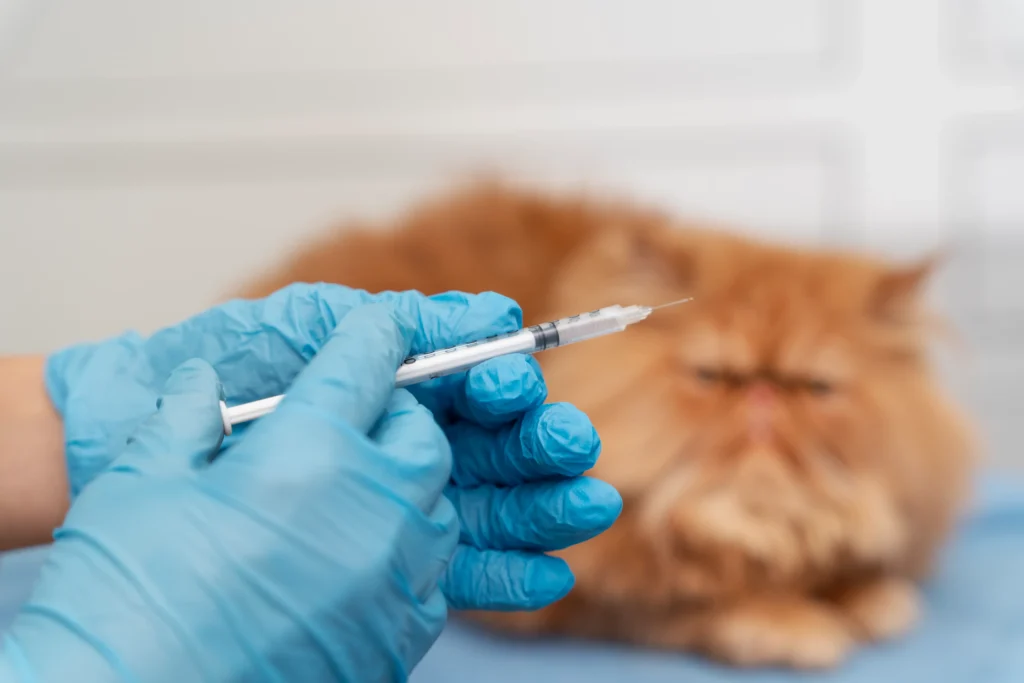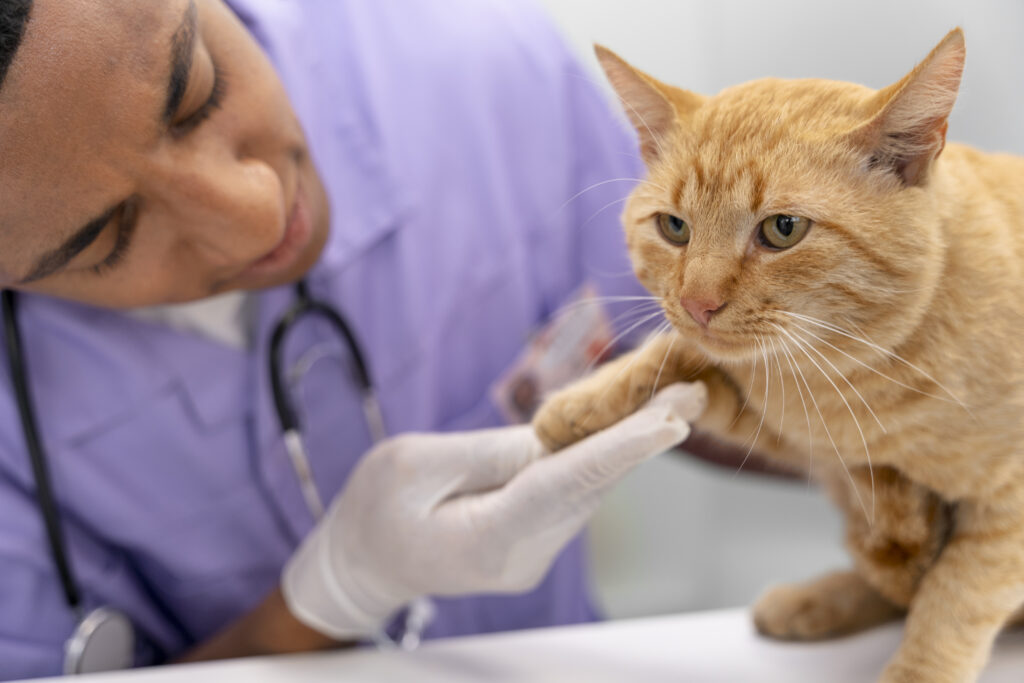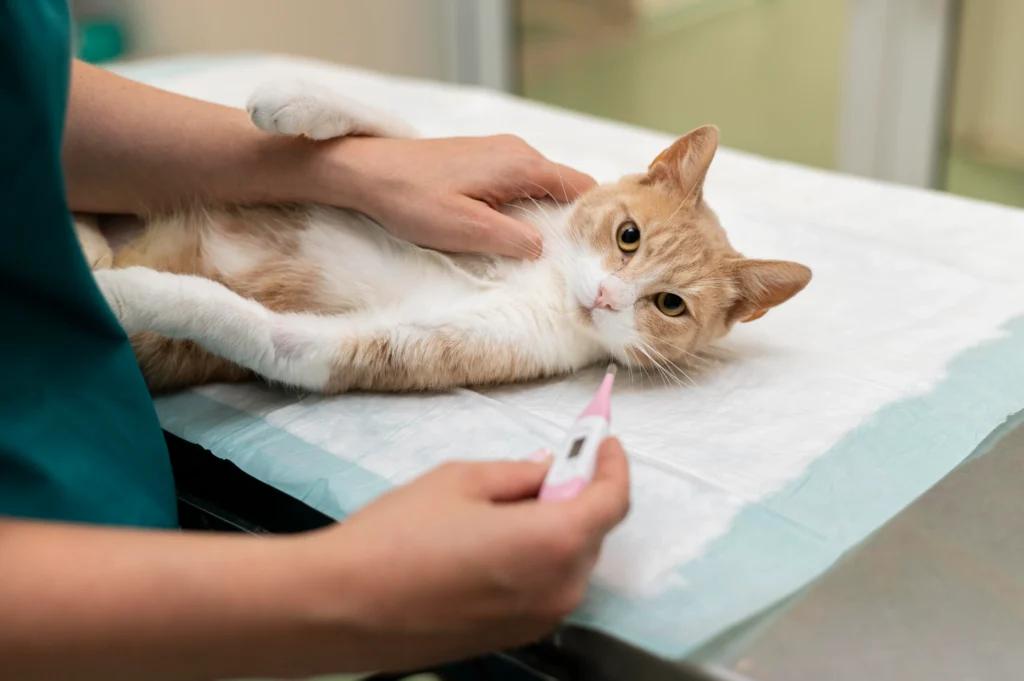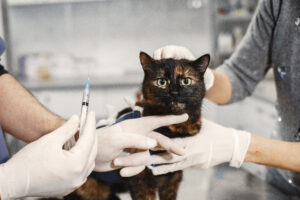Living with unexplained symptoms can be frustrating, especially when you can’t pinpoint the cause. If you’re experiencing persistent discomfort around cats, it might be time to consider a cat allergy test. Cat allergies affect millions of Americans, yet many suffer in silence without proper diagnosis. Understanding when to seek a cat allergy test can make all the difference in your quality of life.

What is a Cat Allergy?
Before delving into the signs that you might need a cat allergy test, it’s essential to understand what a cat allergy actually is. A cat allergy is an immune system reaction that occurs when you come into contact with specific proteins found in a cat’s skin cells (dander), saliva, or urine. Contrary to popular belief, it’s not actually the fur that causes allergic reactions but these proteins – particularly one called Fel d 1, which is produced in cats’ sebaceous glands.
When these proteins come into contact with someone who’s sensitive to them, the immune system identifies them as harmful substances and produces antibodies to combat them. This reaction triggers the release of chemicals like histamine, which cause the allergy symptoms many people experience.
The Importance of Cat Allergy Testing
Getting a proper cat allergy test is crucial for several reasons:
- Accurate diagnosis: Many respiratory conditions share similar symptoms. A cat allergy test can confirm whether your symptoms are indeed due to cat allergies or something else.
- Appropriate treatment: Once diagnosed, you can pursue the most effective treatment options for cat allergies specifically.
- Prevention strategies: Knowing you have a cat allergy allows you to implement targeted avoidance measures.
- Peace of mind: Eliminating the guesswork provides emotional relief and a clear path forward.
Now, let’s examine the four alarming signs that indicate you should consider getting a cat allergy test as soon as possible.
4 Alarming Signs You Need a Cat Allergy Test Now
1. Persistent Respiratory Symptoms Around Cats
One of the most common indicators that you might need a cat allergy test is experiencing respiratory symptoms that worsen when you’re around cats. These symptoms can include:
- Sneezing fits: Frequent, uncontrollable sneezing that begins shortly after cat exposure
- Nasal congestion: Stuffy or runny nose that persists while in a home with cats
- Postnasal drip: Mucus running down the back of your throat, causing coughing or throat clearing
- Coughing or wheezing: Difficulty breathing or chest tightness that worsens around cats
- Sinus pressure: Pain or pressure in your sinuses that develops after cat exposure
If these symptoms consistently appear when you’re around cats and improve when you’re not, it’s a strong indication that you should seek a cat allergy test. Many people dismiss these symptoms as a minor inconvenience, but they can significantly impact your quality of life and, in some cases, develop into more serious respiratory conditions if left untreated.
Dr. Emily Chen, allergist at the American College of Allergy, Asthma and Immunology, notes that “Cat allergies are among the most common animal allergies in the United States, with approximately 15-30% of people with allergies having allergic reactions to cats. Getting a proper cat allergy test is the first step in managing these symptoms effectively.”
2. Skin Reactions After Contact with Cats
Skin reactions are another alarming sign that you may need to consider a cat allergy test. These reactions typically occur when cat allergens come into direct contact with your skin or when you touch your face after petting a cat. Common skin reactions include:
- Hives or rash: Raised, red, itchy bumps that appear on the skin
- Eczema flare-ups: Patches of dry, itchy, inflamed skin that worsen after cat exposure
- Contact dermatitis: Red, itchy rash at the site of contact with a cat
- Facial swelling: Particularly around the eyes, lips, or cheeks after touching a cat and then your face
- Itchy, watery eyes: Redness, tearing, and discomfort that persists while around cats
These skin reactions can range from mildly annoying to severely uncomfortable. If you notice any of these symptoms consistently appearing after interactions with cats, it’s a clear sign that you should seek a cat allergy test to confirm whether cats are indeed the trigger.
According to a study published in the Journal of Allergy and Clinical Immunology, approximately 20-30% of individuals with cat allergies primarily experience skin-related symptoms. A proper cat allergy test can identify whether these skin reactions are caused by cat allergens or other factors.

3. Worsening Asthma Symptoms Around Cats
For individuals with asthma, cat allergies can trigger or worsen asthma symptoms. This connection is particularly concerning because it can lead to serious respiratory distress. Signs that you may need a cat allergy test due to asthma-related concerns include:
- Increased use of rescue inhalers: Needing your inhaler more frequently when around cats
- Nighttime awakening with asthma symptoms: Disturbed sleep due to coughing, wheezing, or shortness of breath, especially if there’s a cat in your bedroom
- Decreased lung function: Noticeable reduction in your ability to breathe deeply or normally around cats
- Asthma attacks: Severe episodes triggered by cat exposure
- Persistent chest tightness: Discomfort or pressure in your chest that worsens in homes with cats
The American Lung Association reports that pet allergens, particularly cat allergens, are a significant trigger for asthma symptoms. If you have asthma and notice a pattern of worsening symptoms around cats, a cat allergy test is not just recommended—it’s essential for your respiratory health and safety.
Dr. James Taylor of the National Institute of Allergy and Infectious Diseases emphasizes, “For asthmatic individuals, identifying and managing cat allergies can be life-changing. A proper cat allergy test allows for targeted treatment approaches that can significantly improve asthma control.”
4. Symptoms That Persist Despite Cleaning Efforts
If you or someone in your household has a cat, you might notice that your symptoms persist despite rigorous cleaning efforts. This persistence is a telling sign that you should consider a cat allergy test, as it indicates your sensitivity to cat allergens might be significant. Signs include:
- Symptoms that continue despite regular vacuuming and dusting
- Reactions that occur even in rooms the cat doesn’t enter
- Allergic responses that persist even after the cat has been removed from the home temporarily
- Symptoms that return immediately upon entering a home with cats, even if the cats are not visible
- Allergic reactions to clothing or items that have been in a home with cats
Cat allergens are notoriously difficult to eliminate from indoor environments. They’re lightweight, easily airborne, and can remain in a home for months after a cat has been removed. If your symptoms persist despite your best cleaning efforts, a cat allergy test can confirm whether cat allergens are the culprit and help you develop more effective management strategies.
The Environmental Protection Agency notes that cat allergens can be found in every home in the United States, even those without cats, due to their pervasive nature and how easily they can be transported on clothing and other items.
Types of Cat Allergy Tests Available
If you recognize any of the alarming signs mentioned above, several types of cat allergy tests are available to determine whether you have a cat allergy. Understanding your options can help you make an informed decision about which test for cat allergy is right for you.
1. Skin Prick Test (Cat Allergy Skin Test)
A skin prick test is one of the most common methods to diagnose cat allergies. During this test:
- Your allergist will place a small amount of cat allergen extract on your skin, typically on your forearm or back
- The skin is then pricked or scratched to allow the allergen to enter
- If you’re allergic, a raised, red, itchy bump (similar to a mosquito bite) will develop within 15-20 minutes
The skin prick test is highly accurate for diagnosing cat allergies and provides immediate results. According to the American Academy of Allergy, Asthma & Immunology, skin prick tests have a sensitivity of approximately 85-95% for cat allergies.
Dr. Lisa Johnson, allergist at Cleveland Clinic, explains, “The cat allergy skin test is often our first-line diagnostic tool because it’s quick, relatively painless, and highly sensitive. It allows us to observe the body’s immediate reaction to cat allergens in a controlled environment.”
2. Blood Test (Cat Allergy Blood Test)
If a skin test isn’t appropriate (for example, if you have a skin condition or are taking medications that might interfere with results), your doctor might recommend a blood test for cat allergies. This test:
- Measures the amount of specific IgE antibodies in your blood that your immune system produces in response to cat allergens
- Requires a simple blood draw
- Takes several days to receive results
- Is sometimes called ImmunoCAP, RAST, or ELISA testing
The cat allergy blood test is particularly useful for people who can’t undergo skin testing due to skin conditions, age, or medication use. While slightly less sensitive than skin testing, blood tests are still highly reliable for diagnosing cat allergies.
Research published in the Annals of Allergy, Asthma & Immunology suggests that modern blood tests for cat allergies have a sensitivity of approximately 70-90%, making them a valuable diagnostic tool when skin testing isn’t feasible.
3. Cat Allergy Testing at Home (Home Cat Allergy Test Kit)
For those who prefer the convenience of home testing, several home cat allergy test kits are now available on the market. These kits:
- Allow you to collect a small blood sample at home (usually via finger prick)
- Include materials to mail your sample to a laboratory
- Provide results within 1-2 weeks
- Test for IgE antibodies to common cat allergens
While home cat allergy test kits offer convenience, it’s important to note that they may not be as accurate as tests performed by healthcare professionals. Additionally, without a doctor’s guidance, you might have difficulty interpreting the results or understanding the next steps.
Dr. Michael Roberts of Johns Hopkins Allergy Center cautions, “Home cat allergy test kits can be a useful screening tool, but positive results should always be confirmed with professional testing. The interpretation of allergy test results requires medical expertise and consideration of the patient’s complete clinical picture.”
4. Elimination-Challenge Test
Sometimes, your doctor might recommend an elimination-challenge test, which involves:
- Completely avoiding cats and cat environments for a period (typically 2-4 weeks)
- Monitoring whether your symptoms improve during this elimination period
- If symptoms improve, carefully reintroducing exposure to cats to see if symptoms return
This approach isn’t a formal “test” but can provide valuable information about your body’s response to cat allergens in real-world conditions. It’s particularly useful when test results are inconclusive or when trying to determine the severity of your cat allergy.

The Cost of Cat Allergy Test: What to Expect
One common concern for many people considering a cat allergy test is the cost. The price can vary significantly based on several factors:
Skin Prick Test
- Average cost without insurance: $60-$300
- With insurance: Typically covered with a specialist copay ($30-$60)
Blood Test
- Average cost without insurance: $200-$1,000 (depending on how many allergens are tested)
- With insurance: Usually covered with copay and potential lab fees
Home Cat Allergy Test Kit
- Cost range: $30-$200 depending on the brand and comprehensiveness
Additional Costs to Consider
- Specialist consultation fees ($100-$400)
- Follow-up appointments ($75-$200)
- Prescribed medications or treatments
Most health insurance plans cover allergy testing when deemed medically necessary. If you’re concerned about the cost of cat allergy test procedures, contact your insurance provider before scheduling to understand your coverage.
According to a survey by the American Academy of Allergy, Asthma & Immunology, approximately 85% of patients with suspected allergies found that their insurance covered at least partial costs of professional allergy testing.
Finding Cat Allergy Test Near Me: Where to Get Tested
If you’re experiencing symptoms and wondering “where can I find a cat allergy test near me?”, there are several options to consider:
1. Allergist/Immunologist
The most specialized option is to see a board-certified allergist or immunologist. These physicians specialize in diagnosing and treating allergies and can provide the most comprehensive testing and treatment plans.
2. Primary Care Physician
Your regular doctor can often perform basic allergy testing or refer you to a specialist if needed. This is often the most accessible starting point for many patients.
3. ENT (Ear, Nose, and Throat) Specialists
Some otolaryngologists offer allergy testing services, particularly for allergies that affect the upper respiratory system.
4. Telemedicine Allergy Services
Some companies now offer initial allergy consultations online, which can help determine if you need in-person testing.
5. Retail Health Clinics
Some pharmacy-based clinics offer basic allergy testing services, though these may not be as comprehensive as those provided by specialists.
To find the best option near you:
- Check with your insurance provider for in-network specialists
- Ask for referrals from your primary care physician
- Search the American College of Allergy, Asthma & Immunology’s allergist locator
- Read online reviews and patient testimonials
Cat Allergy Symptoms: What to Watch For
Understanding the full spectrum of cat allergy symptoms can help you determine whether a cat allergy test is necessary. Cat allergy symptoms typically fall into several categories:
Respiratory Symptoms
- Sneezing
- Runny or stuffy nose
- Coughing
- Chest tightness
- Shortness of breath
- Wheezing
- Sinus pressure
- Itchy or sore throat
Eye Symptoms
- Red, itchy eyes
- Watery eyes
- Swollen eyes
- Dark circles under eyes (allergic shiners)
- Sensitivity to light
Skin Symptoms
- Hives or rash
- Eczema flare-ups
- Red or irritated skin
- Itching
- Swelling, especially of the face, lips, or eyelids
Less Common Symptoms
- Headaches
- Fatigue
- Difficulty sleeping
- Ear congestion
- Blue-tinged skin under the eyes
If you experience any combination of these symptoms consistently around cats, it’s a strong indication that you should consider a cat allergy test. It’s worth noting that symptoms can vary significantly in severity from person to person.
The Asthma and Allergy Foundation of America reports that approximately 30% of Americans with allergies have allergic reactions to cats and dogs, with cat allergies being about twice as common as dog allergies.
How to Know if You’re Allergic to Cats Without Testing
While a formal cat allergy test is the most accurate way to diagnose a cat allergy, there are some observations you can make to help determine if you might be allergic to cats:
1. Symptom Tracking
- Keep a detailed log of when and where your symptoms occur
- Note whether symptoms worsen when you enter homes with cats
- Track if symptoms improve when you’re away from cats for extended periods
2. Exposure Experiments (with caution)
- If safe for you (and you don’t have severe reactions), note how you feel before, during, and after visiting someone with a cat
- Observe whether your symptoms begin shortly after cat exposure
- See if symptoms resolve within hours or days of leaving a cat environment
3. Environmental Clues
- Do you feel worse in certain rooms where a cat spends more time?
- Do your symptoms worsen after petting a cat and then touching your face?
- Are your reactions more severe with certain cats than others?
However, Dr. Sarah Williams of the National Jewish Health Center warns, “Self-diagnosis of cat allergies can be tricky because symptoms may overlap with other conditions like seasonal allergies or colds. A proper cat allergy test provides clarity and prevents unnecessary lifestyle changes based on incorrect assumptions.”
The Best Cat Allergy Test: Professional vs. Home Testing
If you’re wondering what the best cat allergy test is for your situation, it’s important to weigh the pros and cons of professional testing versus home testing:
Professional Testing Advantages:
- Higher accuracy and reliability
- Immediate results (for skin tests)
- Professional interpretation of results
- Comprehensive testing for multiple allergens simultaneously
- Access to immediate medical advice and treatment options
Home Testing Advantages:
- Convenience
- Privacy
- No need for doctor appointments
- Usually lower upfront costs
- Accessibility for those in remote areas
For most people with significant symptoms, professional testing is considered the best cat allergy test option. Board-certified allergists have the training and experience to not only conduct tests but also interpret results in the context of your overall health and symptoms.
Dr. Robert Adams, president of the American College of Allergy, Asthma and Immunology, states, “While home testing has improved, nothing replaces the comprehensive approach of consulting with an allergist who can perform appropriate testing and develop a personalized management plan based on those results.”
What to Expect During a Cat Allergy Test
If you’ve decided to pursue professional testing for cat allergies, knowing what to expect can help ease anxiety about the process:
Before the Test
- Consultation: Your allergist will review your medical history and symptoms
- Medication review: You may need to stop certain medications before testing (antihistamines, for example)
- Preparation instructions: Your doctor will provide specific guidance on how to prepare
During a Skin Prick Test
- Application: Allergen extracts, including cat allergens, are applied to your skin
- Pricking: Your skin is gently pricked to allow the allergen to enter
- Waiting period: You’ll wait 15-20 minutes for reactions to develop
- Measurement: The allergist measures any reactions that occur
During a Blood Test
- Blood draw: A healthcare professional will take a blood sample
- Laboratory analysis: Your blood is sent to a lab to measure specific IgE antibodies
- Results: Unlike skin tests, blood test results are not immediate and may take several days
After the Test
- Results discussion: Your doctor will explain your test results
- Diagnosis confirmation: Based on your test results and clinical history
- Treatment plan: Development of a personalized plan to manage your cat allergy
- Follow-up: Scheduling of any necessary follow-up appointments
A cat allergy test appointment typically takes about 30-60 minutes for a skin test, while a blood test appointment is usually shorter but requires waiting for results.
Cat Allergy Diagnosis: Understanding Your Test Results
After completing a cat allergy test, understanding your results is crucial for developing an effective management plan:
Skin Test Results
- Positive reaction: A wheal (raised bump) that’s larger than 3mm compared to the control indicates a potential allergy
- Negative reaction: No significant skin reaction indicates you’re likely not allergic to the tested substance
- Severity indicator: The size of the reaction generally correlates with the sensitivity level, though not always with symptom severity
Blood Test Results
- Specific IgE levels: Measured in kilounits per liter (kU/L) or classes (0-6)
- Class 0 (less than 0.35 kU/L): Negative
- Class 1 (0.35-0.70 kU/L): Borderline
- Class 2-6 (0.71-100+ kU/L): Positive, with higher classes indicating stronger allergic sensitivity
Interpretation Considerations
- A positive test alone doesn’t necessarily mean you’ll have symptoms
- Correlation with your clinical history is essential
- False positives and false negatives can occur, though they’re relatively rare
- Multiple allergen sensitivities may complicate interpretation
Dr. Jessica Martin, allergist and researcher at Mount Sinai, explains, “Cat allergy test results should always be interpreted in the context of the patient’s symptoms and exposure history. A positive test with corresponding symptoms offers clear direction, but test results without clinical correlation require careful consideration.”
Can You Test for Cat Allergies If You Don’t Currently Have Symptoms?
Many people wonder if they can test for cat allergies proactively, before experiencing symptoms or bringing a cat into their home. The answer is yes, you can test for cat allergies even without current symptoms. This might be particularly relevant if:
- You’re considering adopting a cat but have a family history of allergies
- You previously had reactions to cats but haven’t been exposed recently
- You’re moving in with someone who has a cat
- You have other allergies and want comprehensive testing
Preventive testing can provide valuable information, but most allergists recommend testing when there’s at least some history of symptoms or a strong family history of allergies. Insurance coverage for purely preventive allergy testing may also be limited.
Dr. Thomas Greene of Mayo Clinic notes, “While we can certainly test for cat allergies in asymptomatic individuals, the clinical relevance of positive results without a history of symptoms can be difficult to determine. Some people with positive tests never develop symptoms when exposed to cats.”
Living with Cat Allergies: Beyond Testing
Once you’ve confirmed a cat allergy through testing, several management approaches are available:
Environmental Controls
- HEPA air purifiers specifically designed to remove pet allergens
- Regular cleaning with vacuum cleaners with HEPA filters
- Washing bedding in hot water weekly
- Creating cat-free zones, especially in bedrooms
- Hard flooring instead of carpeting
- Regular bathing of cats (if you have them)
Medications
- Antihistamines (Zyrtec, Claritin, Allegra)
- Nasal corticosteroids (Flonase, Nasacort)
- Leukotriene modifiers (Singulair)
- Eye drops for allergic conjunctivitis
- Rescue inhalers for asthma symptoms
Immunotherapy
- Allergy shots (subcutaneous immunotherapy)
- Sublingual tablets (under-the-tongue therapy)
- Rush immunotherapy (accelerated treatment schedule)
Complementary Approaches
- Nasal irrigation with saline
- Acupuncture (limited evidence, but some patients report benefits)
- Probiotics (emerging research suggests possible benefits)
The Asthma and Allergy Foundation of America reports that allergen immunotherapy can reduce symptoms by 85-90% in many patients with cat allergies, making it a highly effective long-term solution.
Cat Allergy Test for Humans vs. Allergic to Cats Test: Is There a Difference?
You might encounter different terminology when researching cat allergy testing. Terms like “cat allergy test for humans,” “allergic to cats test,” or “do I have a cat allergy test” all refer to the same testing procedures discussed throughout this article. These tests determine whether a human is allergic to cat allergens.
This is entirely different from testing to see if your cat has allergies (to food, environmental factors, etc.), which would be performed by a veterinarian using different methods.
Cat Hair Allergy Test: A Common Misconception
Many people specifically search for a “cat hair allergy test,” believing that cat hair itself is the allergen. However, this is a common misconception. While cat hair can certainly transport allergens, the primary cat allergens are proteins found in:
- Cat dander (dead skin cells)
- Saliva
- Urine
- Sebaceous gland secretions
When you undergo a cat allergy test, you’re being tested for these specific allergenic proteins (primarily Fel d 1), not for an allergy to the hair itself. Even hairless cat breeds produce these allergens, which is why some people still experience allergic reactions to breeds like the Sphynx.
Special Considerations for Cat Allergy Testing
Testing for Children
- Children can be tested for cat allergies, but techniques may be modified
- Skin tests use smaller amounts of allergen
- Blood tests may be preferred for very young children
- Results interpretation may differ for pediatric patients
Testing During Pregnancy
- Most allergists recommend postponing skin testing during pregnancy
- Blood tests are generally considered safe during pregnancy
- Benefits vs. risks should be discussed with both allergist and obstetrician
Testing with Underlying Skin Conditions
- Eczema, dermatitis, or psoriasis may affect skin test results
- Blood testing is often recommended for these patients
- Alternative testing sites may be used if skin conditions are localized
Conclusion: The Value of a Cat Allergy Test
Living with undiagnosed cat allergies can significantly impact your quality of life. If you’ve noticed any of the four alarming signs discussed—persistent respiratory symptoms, skin reactions, worsening asthma, or symptoms that persist despite cleaning—don’t hesitate to seek a cat allergy test. Whether you choose a professional skin test, blood test, or starting with a home cat allergy test kit, getting answers is the first step toward relief.
Understanding your specific allergic triggers empowers you to make informed decisions about cat ownership, environmental modifications, and treatment options. With proper diagnosis and management, many people with cat allergies can coexist with cats or at least function comfortably in environments where cats are present.
Take control of your respiratory health today by consulting with a healthcare provider about cat allergy testing options. The clarity and peace of mind that comes from knowing exactly what you’re dealing with is invaluable for your long-term wellbeing.
FAQs About Cat Allergy Testing
How accurate is a cat allergy test?
Professional cat allergy tests are highly accurate, with skin tests having a sensitivity of 85-95% and blood tests around 70-90%. However, results should always be interpreted alongside your clinical history.
How long does a cat allergy test take?
A skin prick test takes approximately 30-60 minutes from start to finish. Blood tests take just a few minutes for the blood draw, but results may take several days.
Can you develop cat allergies later in life?
Yes, it’s possible to develop cat allergies at any age, even after years of living with cats without problems. Adult-onset allergies are increasingly common.
Are there hypoallergenic cats?
No truly hypoallergenic cats exist, as all cats produce allergenic proteins. However, some breeds may produce fewer allergens or cause less severe reactions in some individuals.
Will my insurance cover cat allergy testing?
Most health insurance plans cover allergy testing when medically necessary. Contact your insurance provider to understand your specific coverage details.
How often should I repeat a cat allergy test?
For most people, a single comprehensive cat allergy test is sufficient. However, retesting might be recommended if your symptoms change significantly or if you’re monitoring the effectiveness of immunotherapy.
Can I be tested for allergies to specific cat breeds?
Standard cat allergy tests identify sensitivity to common cat allergens present in all breeds. Currently, breed-specific testing is not generally available or medically validated.
What’s the best cat allergy test for children?
For children under 2, blood tests are often preferred. For older children, skin prick tests are generally safe and more immediately informative.
Can a cat allergy test determine the severity of my allergy?
While test results may indicate sensitivity levels, they don’t always correlate perfectly with symptom severity. Your clinical history and symptom pattern are equally important in determining severity.
Is testing for pet allergies the same as testing for cat allergies?
Testing for pet allergies may include cats along with dogs and other pets. A specific cat allergy test focuses solely on cat allergens.






